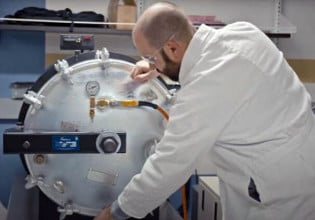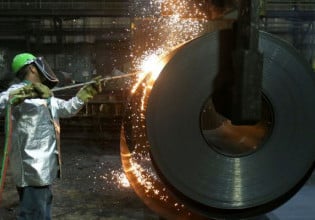DOE Launches ReCell Center for Research into Lithium-Ion Battery Recycling
The use of lithium-ion batteries has surged in recent years, starting with consumer electronics and expanding into numerous applications, including the growing number of electric and hybrid vehicles.
However, the technology to optimize the recycling of these batteries has not kept up with the ever-growing adoption of lithium-ion batteries.
The launch of the U.S. Department of Energy's (DOE) first lithium-ion battery recycling center, called the ReCell Center, is expected to help the United States grow a globally competitive recycling industry and reduce our reliance on foreign sources of battery materials.
One goal of the ReCell Center is to drive technology toward the development closed-loop recycling methods, where materials from spent batteries can be directly recycled, minimizing energy use and waste by eliminating the steps normally required to make lithium-ion batteries; mining and processing.
 Diagram of the proposed closed-loop recycling process for lithium-ion batteries (courtesy of Argonne National Laboratory) (Click on image to enlarge).
Diagram of the proposed closed-loop recycling process for lithium-ion batteries (courtesy of Argonne National Laboratory) (Click on image to enlarge).
"ReCell brings our national laboratories, the private sector, and universities together to develop advanced technologies that safely and cost-effectively recycle lithium-ion batteries," said Daniel R Simmons, Assistant Secretary of DOE's Office of Energy Efficiency and Renewable Energy (EERE). "This center will create jobs and create a national supply of lithium-based battery materials, as well as spur the adoption of an affordable electric vehicle economy."
The Manufacturing Engineering Research Facility at Argonne National Laboratory will be used to prepare samples of battery materials for testing and characterization. Argonne has several labs that will be used for ReCell including the battery-post test laboratory. (See image above courtesy of Argonne National Laboratory).
Recycled materials from lithium-ion batteries can be reused in new batteries, reducing production costs by an estimated 10 to 30 percent. This price reduction could help lower the overall cost of EV batteries to meet the DOE's goal of $80 per kWh.
To encourage the development of new recycling methods and new battery configurations, members of DOE's Vehicle Technologies Office (VTO) within EERE were on hand at the opening of the ReCell Center at DOE's Argonne National Laboratory.
The center collaborators will target four key research areas to make lithium-ion battery recycling profitable:
- A direct cathode recycling focus intends to develop recycling processes, which can generate products that go directly back into new batteries without costly reprocessing;
- A focus to recover other materials seeks to create technologies that enable cost-effective recycling of other battery materials, thereby providing additional revenue streams;
- The design for recycling focus of the research hopes to develop new battery designs optimized to make future batteries easier to recycle; And
- The modeling and analysis tools focus will seek to devise and utilize modeling and analysis tools to help direct an efficient R&D path and to validate the work performed within the center.
"The ReCell Center will help expedite the pursuit to profitable lithium-ion battery recycling. It combines the nation's leading experts and research tools from academia, industry and government laboratories to solve science challenges that have prevented the U.S. from reaping the economic, environmental and security benefits that come with having a large commercial U.S.-based lithium-ion recycling market," said Jeff Spangenberger, director of the ReCell Center.
The center's overall goal is to create profitable methods to dramatically improve recycling rates and enhance national security by reducing reliance on foreign supplies of critical battery materials such as lithium and cobalt. This goal will further the President's Executive Order 13817, which identifies the need for "developing critical minerals recycling and reprocessing technologies" as part of a broader plan to "ensure secure and reliable supplies of critical minerals."






